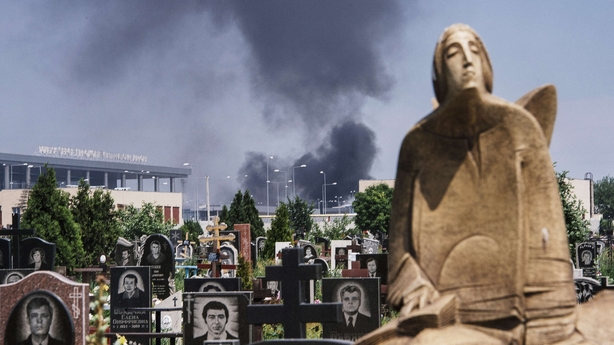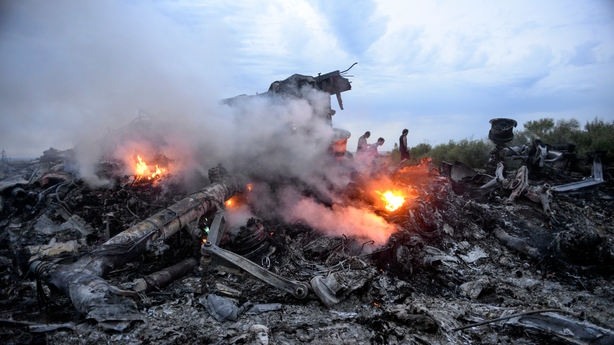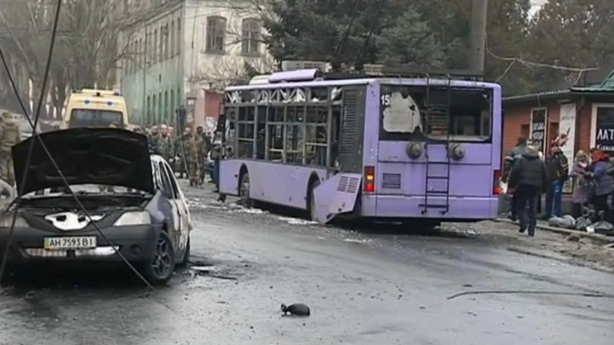The United Nations says that at least 5,350 people have been killed in the conflict between government forces and pro-Russian separatists in eastern Ukraine.
Ukraine and the West accuse Russia of arming the rebels and of having deployed thousands of soldiers in Ukraine - a charge Moscow denies.
Here are some of the key dates in the conflict:
6 April 2014: Two weeks after Russia annexes the Black Sea peninsula of Crimea, pro-Russian demonstrators seize government buildings in towns and cities across Russian-speaking east Ukraine, including Donetsk and Lugansk.
13 April: The Ukrainian government announces the launch of an "anti-terrorist" operation aimed at retaking the rebel zones.
11 May: Voters back independence in referendums in Lugansk and Donetsk that Ukraine and the West reject as illegitimate.
25 May: Ukraine's presidential election is won by Petro Poroshenko.

26 May: A major battle breaks out for control of Donetsk's airport after it is seized by rebels.
27 June: The EU and Ukraine sign an association agreement, whose initial rejection by pro-Russian forces in the previous government originally sparked the Ukraine crisis.
5 July: Rebels abandon their main base of Slaviansk in the face of a government onslaught, retreating en masse to regional centre Donetsk.

17 July: Malaysia Airlines flight MH17 is shot down over rebel-held territory, killing all 298 people on board.
29 July: The EU and the United States broaden sanctions against Russia.
25 August: Rebels mount a counter-offensive in the southeast, reportedly backed by Russian troops and heavy weapons.
5 September: A ceasefire is signed in Minsk, yet violence continues.
26 October: Pro-Western parties win a majority of seats in Ukraine parliamentary elections that are boycotted in the east.
2 November: Separatists in eastern Ukraine vote in Russian-backed elections that Ukraine and the West refuse to recognise.
12 November: NATO accuses Russia of sending additional columns of tanks, troops and military hardware into Ukraine.

22 January 2015: Donetsk airport falls to rebel forces, who two days later launch an assault on the strategic government-held port city of Mariupol.
6 February: The leaders of Russia, Germany and France agree in Moscow to draw up a blueprint to end fighting, a day after Angela Merkel and Francois Hollande presented their plan to the Ukrainian government.
8 February: A peace summit between France, Germany, Russia and Ukraine is planned for 10 February in Minsk.
9 February: The Ukrainian military claims at least 1,500 Russian troops and convoys of military hardware have entered the country in the previous two days.
The EU agrees to postpone the implementation of new sanctions against Russia pending the Minsk summit.
Ms Merkel, who opposes sending arms to Ukraine, visits Washington for talks with US President Barack Obama on the peace initiative.
Mr Obama says that he has not yet decided whether to supply weapons to Ukraine.
Ukraine town 'deserted and destroyed' after rebel offensive
10 February: Intense fighting resumes, including a rocket strike on the government's military headquarters in the east, far from rebel positions.
Rebels seek to encircle the railway hub of Deblatseve. Ukrainian forces launch a counter-offensive around Mariupol, retaking control of three villages east of the city.
Diplomats scramble to finalise a deal ahead of the Minsk summit.
12 February: Russian, Ukrainian, French and German leaders agree on a ceasefire and the withdrawal of heavy weapons from the front lines.
The ceasefire is to begin from 15 February.

